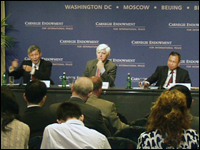Registration
You will receive an email confirming your registration.
IMGXYZ871IMGZYXIn a talk moderated by Carnegie Senior Associate Albert Keidel, Minxin Pei, director of the Carnegie China Program and Wing Thye Woo, senior fellow at the John L. Thornton China Center at the Brookings Institution, discussed the implications of the recent National Party Congress.
Woo opened by emphasizing the most distinct character of the newly selected politburo—technical competence. According to Woo, the general education level of politburo members has increased dramatically—most newly appointed officials hold doctorate degrees. This is a clear indication that the Hu-Wen administration is strongly interested in highly-educated process managers.
Woo shared his belief that the objective of this year’s National Party Congress had less to do with a drastic increase in governance effectiveness than with strengthening policies that address priority issues. These issues include urban housing conservation, energy, economic stability, and environmental protection, particularly the political integration of provincial environmental protection agencies into the central government. The Hu-Wen government also stated their aim to level the inflation rate to 4.8 percent and slow economic growth to 8 percent. However, Woo considers these target numbers unlikely, due to the increase in overall production cost as the central government begins reinforcing environmental regulations and labor rights.
The two methods used to slow inflation are a reduction in investment and a reduction in exports. The Chinese government does not perceive inflation as a valid reason to cut down investment in China’s under-developed infrastructure, therefore a reduction in inflation will only come from the exports sector. Nevertheless, Woo predicts that China’s inflation rate in 2008 will be 7 percent while overall growth rate will remain above 9.5 percent.
Pei also presented his analysis, outlining the three highlights of the Congress:
1. Balancing growth & addressing public concerns
2. Unprecedented transparency to media
3. Innovative, liberating public policy thinking
Pei also pointed out the return of so-called “Shanghai Gang.” Indeed, 6 out of the new politburo’s 27 appointees are from Shanghai.
Both Woo and Pei agreed that any policy reform that stems from this year’s Party Congress will be incremental rather than radical, primarily due to the Hu-Wen administration’s lack of political capital.
This summary was prepared by Wayne Chen, Junior Fellow in the China Program
